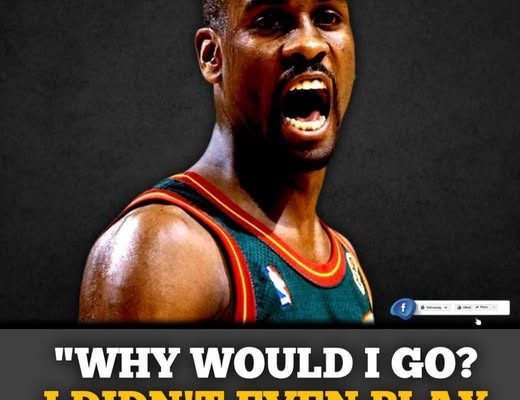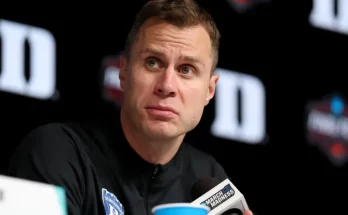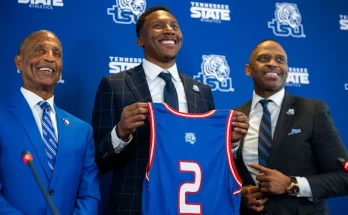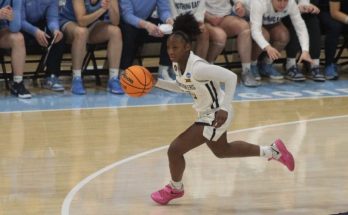The Oklahoma City Thunder recently announced plans to retire the jersey of Seattle SuperSonics legend Gary Payton, igniting what has become a fiery conversation in NBA circles about legacy, loyalty, and location. Payton, a Hall of Famer, nine-time NBA All-Star, and perhaps the greatest defensive point guard in league history, made headlines this week with a sharp rebuke to the franchise’s overture. His comment was unambiguous and brimming with the brashness fans have come to expect from “The Glove”: “Why would I go? I didn’t even play in Oklahoma!” Those words now hang in the air as a pointed reminder that not every historical tie can be cleanly inherited when a franchise relocates.
Payton’s reaction taps into a deeper wound that many Seattle sports fans still feel to this day. The SuperSonics were not just a basketball team—they were part of the soul of the city. From 1967 until their relocation in 2008, the Sonics were an institution in the Pacific Northwest, with a passionate fanbase and a rich legacy that included an NBA championship in 1979 and a resurgence in the ’90s led by Payton and Shawn Kemp. When Clay Bennett purchased the team and eventually moved it to Oklahoma City, it wasn’t just a change of scenery—it was a civic betrayal that still stings in Seattle.
For Gary Payton, whose entire identity as a player is deeply entwined with the green and gold, this is not simply a matter of honoring past achievements. It’s about place. It’s about authenticity. And it’s about respect for the community that raised him as a professional athlete. Payton was drafted second overall by the SuperSonics in 1990 and spent 13 seasons with the team, becoming its all-time leader in points, assists, and steals. His fierce competitiveness, lockdown defense, and trash-talking flair were synonymous with Seattle basketball. To suggest that such a legacy can now be repackaged under the Thunder brand is, to Payton and many fans, not just tone-deaf—it’s heretical.
The Thunder, to their credit, have attempted over the years to walk a delicate line. They hold the legal and historical rights to the SuperSonics’ records and heritage, but they’ve largely refrained from leaning too heavily into that past. Their branding, marketing, and internal culture have focused almost entirely on the present and future in Oklahoma. So when news broke that they intended to retire Payton’s jersey, the gesture struck many as surprising—and to some, disingenuous.
From the Thunder’s perspective, it’s an attempt to recognize greatness. Payton is a figure who deserves all the accolades he receives. His contributions to the game are undeniable, and his place in history is secure. But in their desire to celebrate that legacy, the Thunder may have underestimated the emotional and geographical weight of the SuperSonics’ history. A jersey retirement is not a hollow ceremonial act. It is deeply symbolic, a public acknowledgment that a player’s time with the franchise left an indelible mark. For Payton, that mark was left in Seattle, not Oklahoma City.
Payton’s unwillingness to attend any such ceremony hosted by the Thunder is not a slight against Oklahoma City as a city or its fans, but rather a principled stance on authenticity. “Why would I go?” isn’t just rhetorical—it’s a pointed reminder that he never wore a Thunder jersey, never played a game in Oklahoma, and never represented anything other than Seattle. It’s also a gesture of solidarity with a Seattle fanbase that has been deprived of NBA basketball for over 15 years and continues to feel erased in moments like this.
The NBA’s decision to allow the SuperSonics’ legacy to transfer wholesale to Oklahoma City has long been a source of debate. Most professional leagues keep franchise records and achievements with the city, not the team. When the Cleveland Browns moved to Baltimore in 1996, the NFL made the unprecedented decision to leave the Browns’ name, colors, and history in Cleveland, allowing the team to be reborn in 1999 with its legacy intact. The new Baltimore Ravens, meanwhile, started fresh, free from any confusion. The NBA chose a different path with the Sonics-Thunder relocation, and moments like this highlight the awkwardness of that decision.
The question now becomes: who gets to honor Gary Payton? Who gets to celebrate the achievements of Shawn Kemp, Detlef Schrempf, or Jack Sikma? Can a city that never saw those players compete in person genuinely lay claim to their legacies? The Thunder seem to believe they can, or at least that they have the right to try. But Payton’s firm rejection of their offer suggests that the players themselves may see things differently.
Payton has made no secret of his desire to see the NBA return to Seattle. He has been vocal in his support of expansion or relocation that would bring a team back to the city. In his eyes, the proper place for any celebration of SuperSonics history is not Oklahoma City but Seattle. For years, fans have lobbied for the league to make that dream a reality, and NBA Commissioner Adam Silver has acknowledged Seattle as a strong candidate for future expansion. When that day comes—and most believe it will—there will be a natural home for tributes to Payton, Kemp, and the Sonics legacy. Until then, Payton seems content to wait.
Social media exploded with reactions to Payton’s statement. Some fans praised him for his honesty and for standing up for Seattle. Others questioned whether he was being overly harsh, arguing that the Thunder were simply trying to do the right thing by honoring a great player. But Payton’s stance has crystallized a divide in public opinion: one side sees the Thunder as the legitimate successors to the Sonics, while the other sees them as a separate entity with no moral claim to that history.
This moment also speaks to a broader trend in sports, where relocations and rebrandings create complex tensions around identity and allegiance. Teams move, cities change, but fans—and the players who represent them—often remain rooted in place. When that place is lost, so too is a piece of their identity. Payton’s firm response is as much about preserving that identity as it is about rejecting a ceremony.
As the Thunder continue to navigate their place in NBA history, they would do well to consider the emotional nuances that come with honoring the past. Tribute without context can feel hollow. In this case, what might have been a celebration of greatness has become a reminder of disconnection. For fans in Seattle, and for Gary Payton himself, the retirement of his jersey by the Oklahoma City Thunder isn’t a gesture of inclusion—it’s a symbol of what was taken.
The legacy of Gary Payton will endure, regardless of which rafters his jersey hangs in. He’s already in the Hall of Fame. He’s widely respected by fans, peers, and analysts alike. But legacy is also about place, and for Payton, that place will always be Seattle. Until the NBA returns there, any attempt to rewrite that history will feel incomplete.
Whether the Thunder decide to move forward with the retirement without Payton’s presence remains to be seen. Perhaps they will reconsider. Perhaps they will recognize that honoring the past means listening to the voices of those who lived it. Or perhaps they will proceed, jersey raised high, in an arena Payton never called home, while the man himself watches from afar, standing in quiet protest, waiting for Seattle’s rightful return to the NBA stage.



